Why the Personality of a Guinea Pig May Vary by Breed
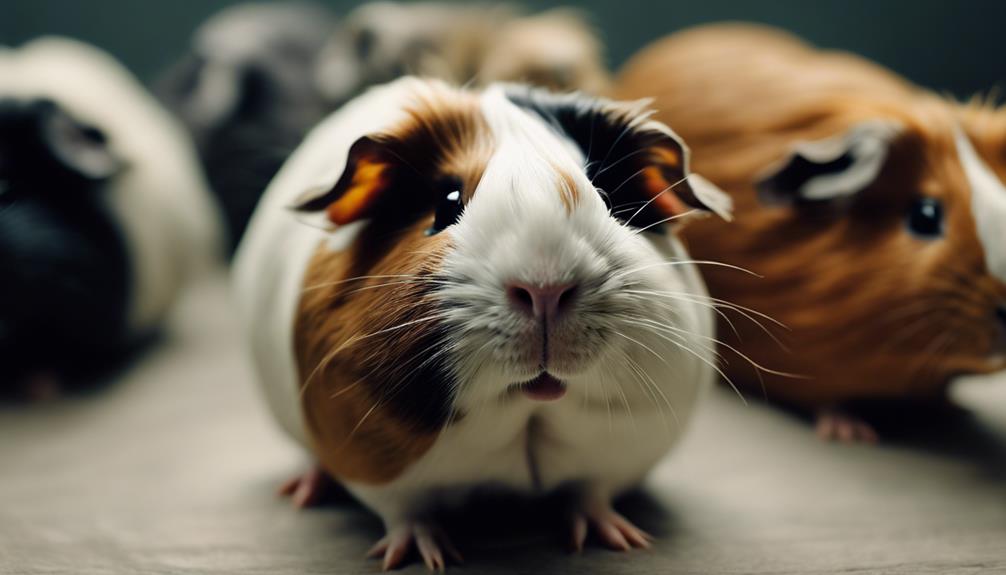
Guinea pig personalities can be influenced by their breed's specific grooming standards. Different breeds may require more or less grooming, affecting their overall temperament. Additionally, exhibition expectations for certain breeds can impact their behavior, as they may be bred for specific qualities that are rewarded in shows. Selective breeding practices also play a role in shaping guinea pig personalities, as breeders may emphasize certain traits over others. Overall, these factors contribute to the diverse range of traits and behaviors seen in guinea pigs of different breeds.
Understanding Guinea Pig Breeds and Personalities
In studying guinea pig breeds and their associated personalities, researchers have observed distinct behavioral characteristics influenced by breeding practices and show standards.
Different guinea pig breeds exhibit specific personality traits tied to their breed-specific characteristics. For instance, Texels are known for their high energy levels, while Peruvians are recognized for their calm demeanor.
Grooming requirements also play a role in shaping a guinea pig's temperament, with long-haired breeds like Silkies needing more attention and care. Show standards further impact behaviors, encouraging certain traits in breeds like Teddies and Abyssinians to excel in competitions, resulting in outgoing and energetic personalities.
Understanding these breed-specific traits and grooming needs is crucial for predicting the behavior of guinea pigs and ensuring appropriate care. By recognizing the influence of show standards and breeding practices on guinea pig personalities, owners can better cater to the needs of their pets based on their specific breed.
Factors Influencing Guinea Pig Personalities
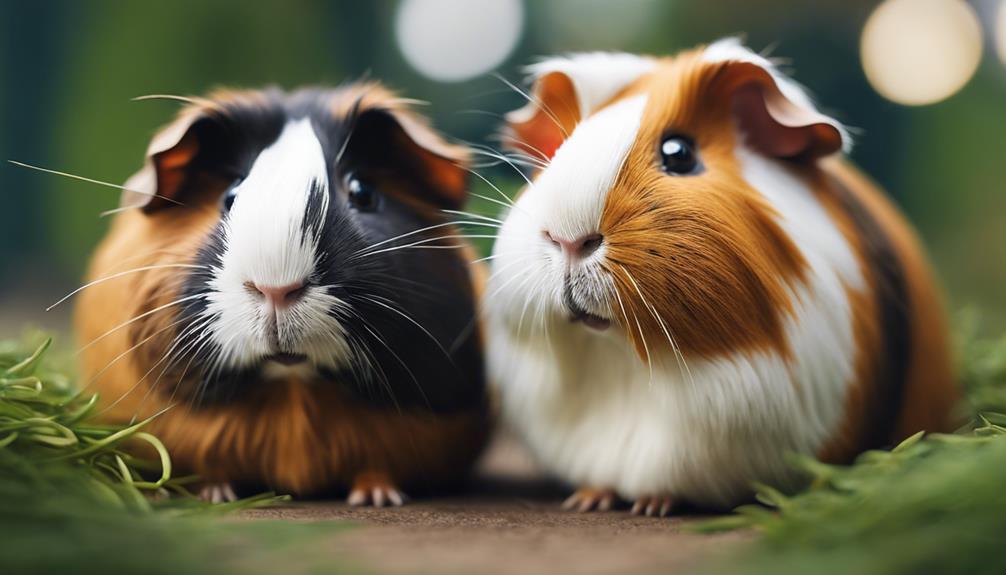
Guinea pig personalities are influenced by various factors, including breed-specific grooming requirements, show standards, handling frequency by breeders, genetic predispositions, and breed-specific traits.
- Breed-specific grooming requirements can impact the amount of human interaction, influencing a guinea pig's comfort level with handling.
- Show standards for different breeds may emphasize certain behaviors, shaping the temperament of guinea pigs in those breeds.
- The frequency of handling by breeders can significantly affect a guinea pig's socialization and overall temperament.
- Genetic predispositions within specific breeds can contribute to variations in personality traits among guinea pigs.
- Breed-specific traits and characteristics play a role in shaping the individual personalities of guinea pigs, highlighting the importance of understanding breed influences on temperament.
These factors interact to mold the unique personalities exhibited by guinea pigs, underscoring the intricate relationship between breed-specific characteristics and the behavioral tendencies of these beloved pets. By considering these influences, breeders and owners can better understand and cater to the diverse personalities that guinea pigs may exhibit.
Behavioral Variances Among Guinea Pig Breeds
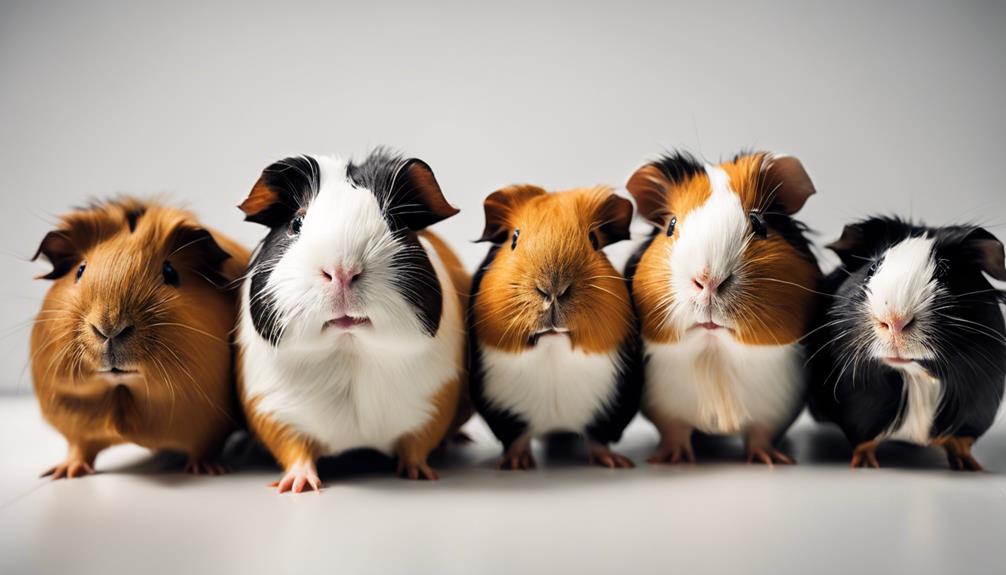
Behavioral disparities among various guinea pig breeds manifest distinctly in their grooming requirements and handling practices. Long-haired breeds such as Peruvians and Silkies are known for their laid-back and calm personality, attributed to their need for daily grooming to prevent matting and maintain coat health. On the other hand, Teddies and Abyssinians exhibit high energy levels and outgoing behavior, often a result of frequent handling for shows and interactions with humans. Short-haired breeds like Americans and Cresteds can display a range of temperaments influenced by breeder handling practices and early socialization. The table below summarizes some common behavioral traits associated with different guinea pig breeds:
| Breed | Personality |
|---|---|
| Peruvians | Laid back and calm |
| Silkies | Relaxed and gentle |
| Teddies | Energetic and outgoing |
| Abyssinians | Sociable and friendly |
| Cresteds | Varied temperament, socialize well |
Understanding these breed-specific tendencies can help potential guinea pig owners choose a pet that aligns with their lifestyle and preferences.
Nature Vs. Nurture: Breed Impact
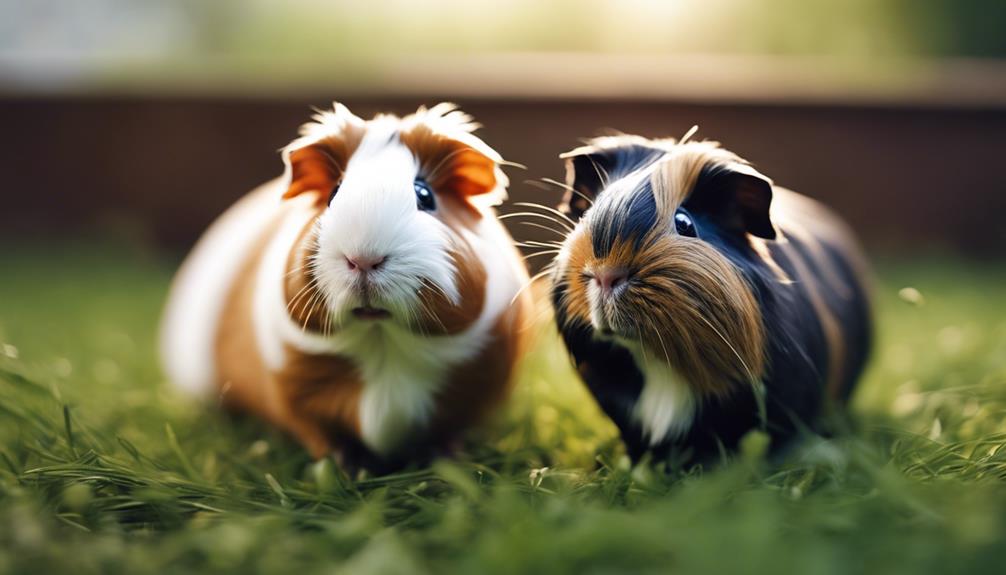
The interplay between inherent genetic predispositions and external environmental influences significantly shapes the behavioral traits exhibited by different guinea pig breeds. When considering the impact of nature versus nurture on guinea pig temperament, several key factors come into play:
- Breed-specific grooming requirements can influence the docility and temperament of guinea pigs, with long-haired breeds like Peruvians and Silkies typically being calmer due to daily grooming needs.
- Energetic breeds like Teddies and Abyssinians are often encouraged to exhibit high activity levels for shows, leading to frequent handling and human interaction, shaping their outgoing personalities.
- Short-haired breeds like Americans and Cresteds can vary in temperament based on breeder handling practices, with those handled more often tending to be tamer and more sociable.
- Show policies and breeding practices can impact the behavior of guinea pig breeds, influencing their temperament traits and comfort levels with humans based on grooming and handling requirements.
- While breed can play a role in shaping general temperament traits, individual variations within breeds are common, highlighting the importance of considering each guinea pig's unique personality regardless of breed.
Notable Personality Traits by Breed
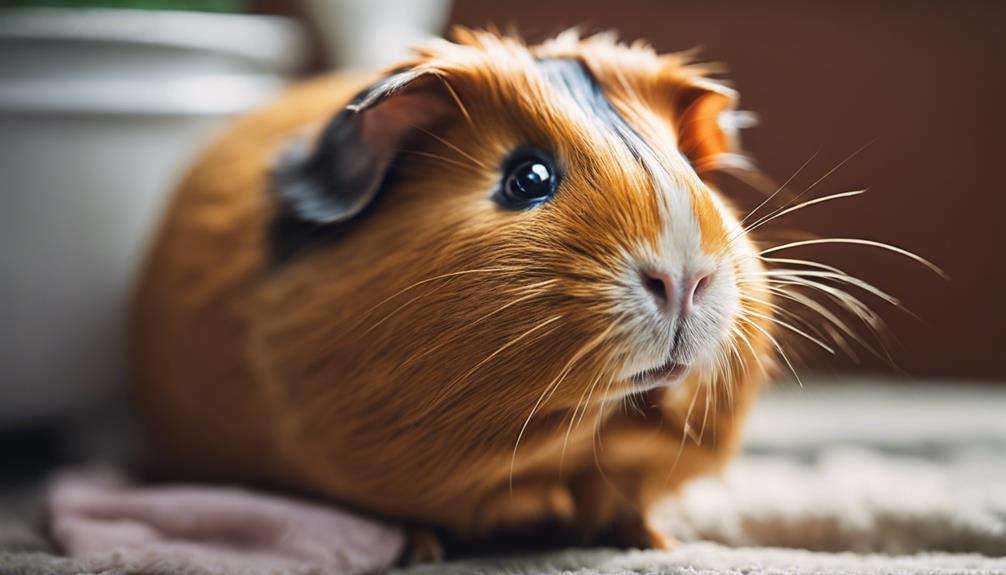
Long-haired guinea pig breeds such as Peruvians and Silkies commonly exhibit a laid-back and calm demeanor, attributed to their docility and daily grooming requirements. Their gentle nature makes them ideal for show boards, where their relaxed temperament can be showcased.
On the other hand, Abyssinians and Teddies are known for being energetic and outgoing, excelling in shows with frequent handling requirements to familiarize them with human interaction. Americans, Cresteds, and other short-haired breeds may vary in temperament based on breeder handling frequency, with those receiving more attention typically being tamer.
Breed plays a significant role in determining general temperament traits, with grooming needs and show demands molding behavior. Regular handling is crucial for a guinea pig's comfort with humans, impacting their sociability. Breed-specific traits, such as the distinctive characteristics of Abyssinians and Peruvians, can be influenced by breeding practices and show standards, further contributing to the varied personalities observed in different guinea pig breeds.
Guinea Pig Breed Characteristics Overview
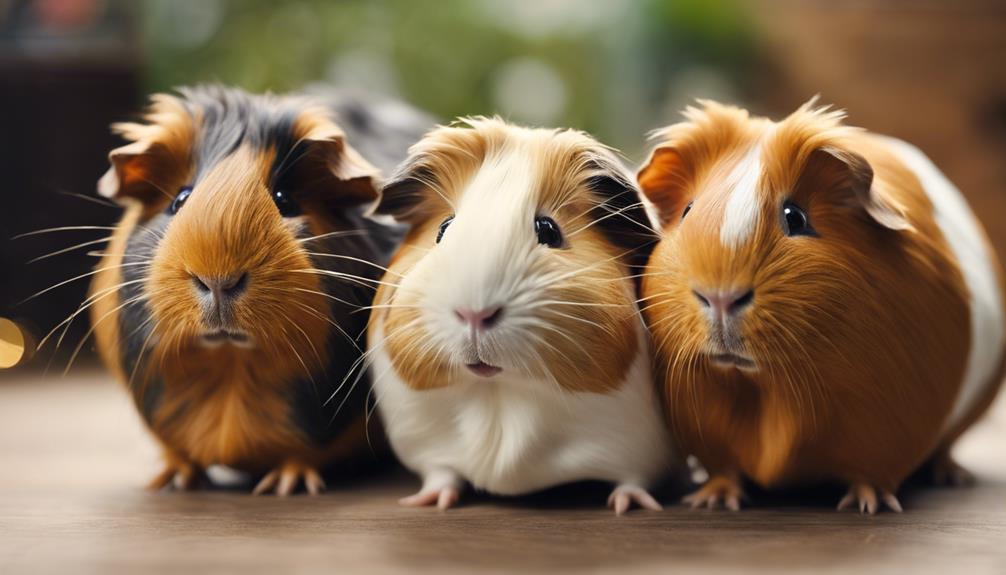
Across various guinea pig breeds, distinct characteristics define their individual qualities and traits.
- Long-haired breeds like Peruvians and Silkies require daily grooming to maintain their coat's health and may display calm and docile personalities as a result.
- Short-haired breeds such as Americans and Cresteds can have diverse temperaments, influenced by the frequency of breeder handling during their early life.
- Texels, a long-haired breed, may exhibit higher energy levels compared to other long-haired breeds due to their lower grooming needs.
Understanding the grooming requirements of each breed is essential in predicting and managing the personalities of guinea pigs.
Breed-specific traits play a significant role in determining the overall temperament and behavior of guinea pigs. Proper care and consideration of these characteristics can lead to a harmonious relationship between owners and their guinea pig companions.
Exploring Breed-Specific Temperaments
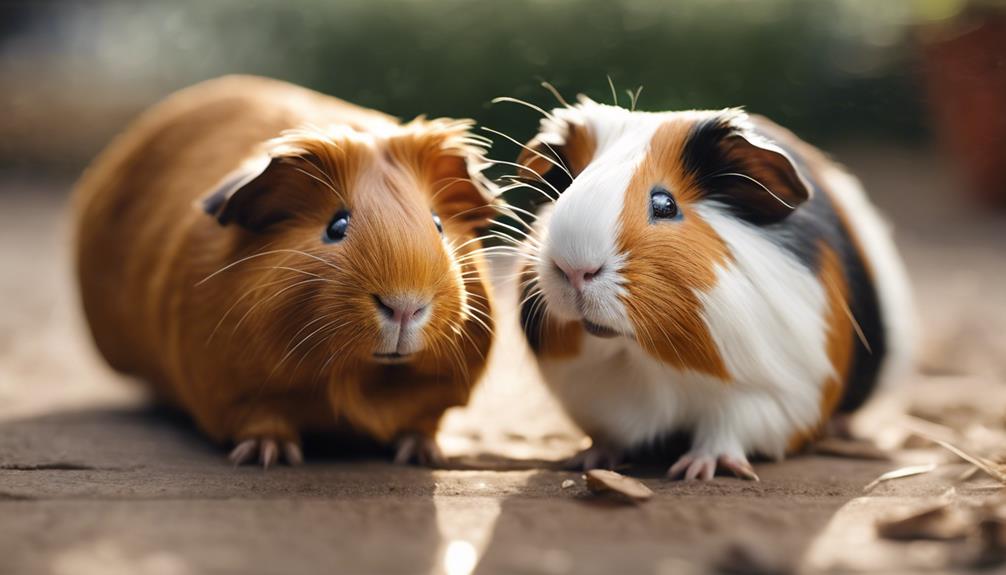
Exploring the temperamental nuances of various guinea pig breeds reveals distinct behavioral patterns shaped by breed-specific characteristics and handling practices.
Long-haired breeds such as Peruvians and Silkies are known for their laid-back and calm demeanor, making them suitable for show boards due to their docility and high grooming needs. Contrarily, Texels, another long-haired breed, may display more energy attributed to their lower grooming requirements.
On the other hand, Abyssinians and Teddies are recognized for their energetic and outgoing nature, excelling in shows with frequent handling to support their lively behavior. Short-haired breeds like Americans and Cresteds showcase varying temperaments influenced by breeder handling frequency, with more handling resulting in friendlier guinea pigs.
While breed plays a role in shaping general temperament traits, regular handling and grooming needs also significantly impact a guinea pig's behavior, although individual variations within breeds are common.
Frequently Asked Questions
Do Different Breeds of Guinea Pigs Have Different Personalities?
Different guinea pig breeds exhibit distinct personalities due to genetic factors, environmental influences, and individual characteristics. Behavioral research highlights temperament differences among breeds, contributing to the varying sociability and energy levels observed in different guinea pig breeds.
Do Different Breeds of Guinea Pigs Get Along?
Different breeds of guinea pigs can get along well if introduced properly. Breed compatibility, social dynamics, behavioral differences, and temperament variations impact inter-breed interactions. Observing cues and providing adequate resources can facilitate bonding between different breeds.
What Are the Personality Traits of a Guinea Pig?
Guinea pigs exhibit varied personality traits. They may differ in handling preferences, activity levels, vocalizations, temperament, and social behaviors. Understanding these nuances helps owners provide tailored care, build strong bonds, and meet their pets' needs effectively.
What Is the Most Affectionate Breed of Guinea Pig?
Peruvian guinea pigs are often considered the most affectionate breed due to their strong bonds with owners. They prefer regular handling, display social behaviors, make vocalizations for attention, enjoy grooming, and engage in playful activities, showcasing their loving nature.











